OTTAWA – It was a sweet but sad day for the Milgaard family when David and Joyce Milgaard’s Law [Bill C-40] was announced by federal Justice Minister David Lametti Feb. 16.
For years, David Milgaard had advocated for the independent Criminal Case Review Commission to make it easier and faster for wrongfully convicted people to have their applications reviewed and to get out of prison. David Milgaard didn’t live to see the results of his hard work but his family believe he was with them in spirit.
“I think that’s amazing,” 17-year-old Robert Milgaard – David Milgaard’s son – told SASKTODAY.ca in a phone interview Thursday after the announcement of the new law. “That is everything he fought for and I’m really glad to see that. He’s smiling at that right now too.”
Mrs. David Milgaard – who didn’t want her first name used – said she was glad David’s dream finally came true and is something that will make a positive change in peoples’ lives. Even though David Milgaard and his wife were separated at the time of his death in May 2022, he always referred to her as “my wife,” and never called her his ex.
“I think he’s smiling,” said Mrs. Milgaard. “It was what he was struggling to get done. Finally, it has come true. At least it happened. It is sad he’s not alive.”
She said David’s passion was to help get innocent people out of prison.
“Some he succeeded. Some he didn’t.”
She, and their two children, encouraged David in his efforts.
“We supported him emotionally, prayerfully. It was his work.”
David Milgaard’s daughter, Julia, was delighted that the commission was named after her father.
“He always helped people,” she said.
David Milgaard's brother Chris Milgaard, who lives in Saskatchewan, was happy with Lametti's announcement.
"I think it is another step forward to helping the wrongly convicted,” Chris Milgaard told SASKTODAY.ca. “Anything that can raise the chances of a person being set free after such an ordeal is a good thing.
"I sent an email to the Justice Minister thanking him for his time and effort in making this happen," added Chris Milgaard.
Lametti introduced Bill C-40 [David and Joyce Milgaard’s Law] to amend the Criminal Code paving the way for the independent commission, which is expected to replace the current ministerial review process to review wrongful convictions.
Robert Milgaard said his dad would have reacted to the announcement by first remembering the injustices he had suffered, but then he would be “thankful” that a Bill was finally passed, especially named after him and his mom.
“I just hope what happened to my dad doesn’t happen to anyone else,” said Robert Milgaard.
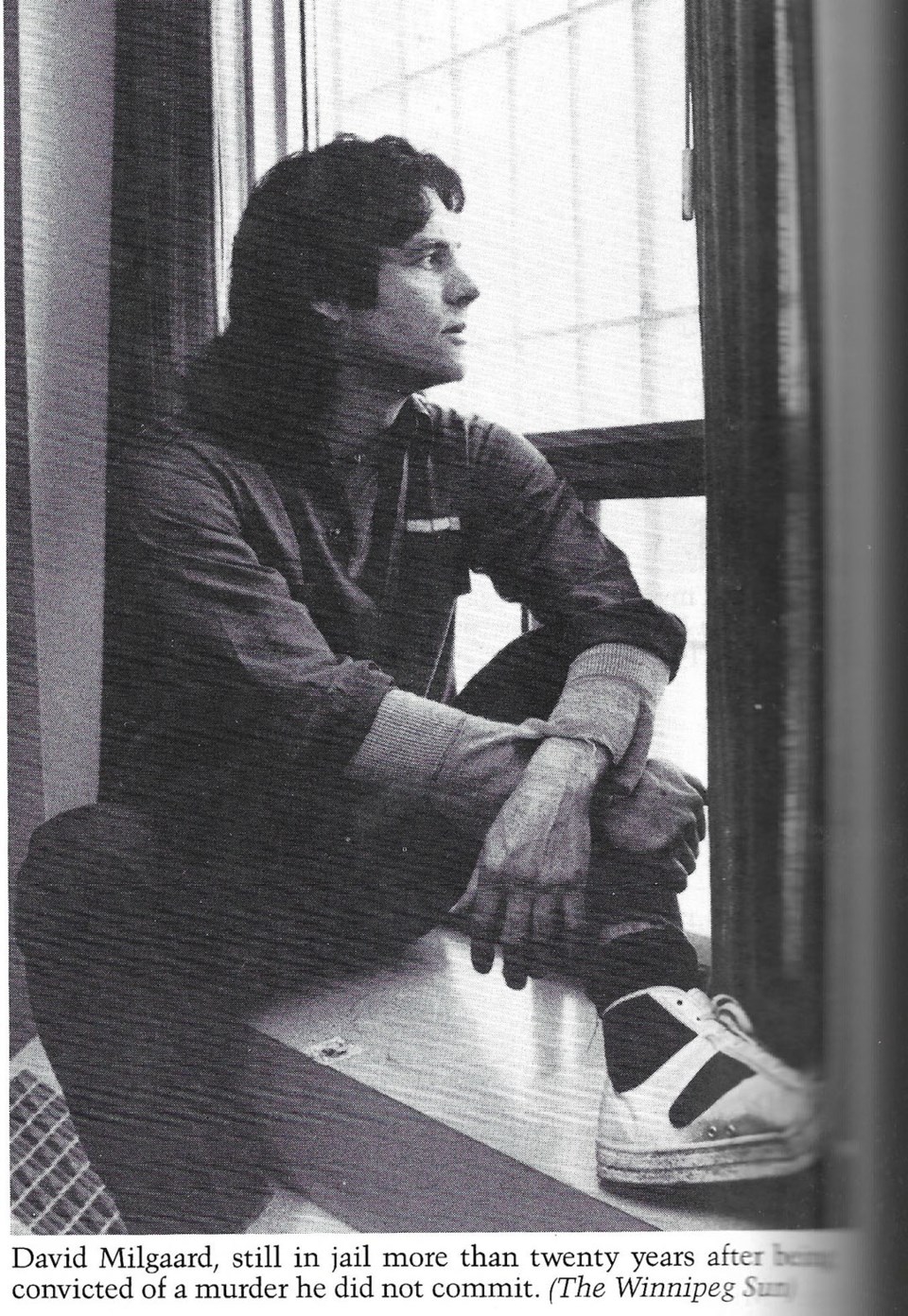
Audio: Hear David Milgaard in his own words during a phone conversation with Lisa Joy/SASKTODAY.ca talk about being an innocent person in prison.
Most infamous case of Canadian injustice
David Milgaard was the victim of one of Canada’s most notorious miscarriages of justice. He spent almost 23 years behind bars before he was released in 1992 after the Supreme Court of Canada ordered Saskatchewan to hold a new trial. Saskatchewan's attorney general chose not to prosecute him again for the 1969 rape and murder of Saskatoon nursing assistant Gail Miller.
Then, in 1997, DNA evidence exonerated David Milgaard and identified serial rapist Larry Fisher as Gail Miller’s killer. In November 1999, Fisher was convicted of Miller’s rape and murder. He died in a British Columbia prison at the age of 65 in June 2015.
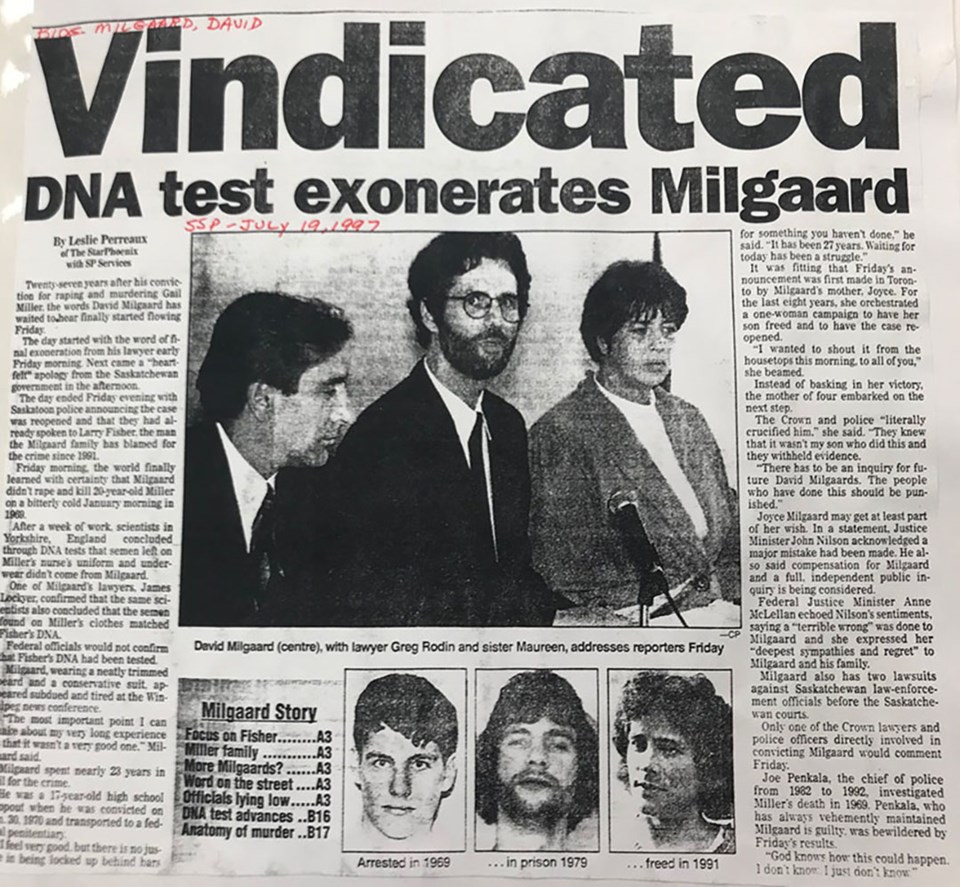
Sad, sweet day: James Lockyer
Lawyer James Lockyer - who co-founded Innocence Canada and represented Joyce Milgaard at Saskatchewan’s public inquiry into David Milgaard’s wrongful conviction – was invited to attend Parliament in Ottawa for the announcement Thursday. Lockyer told SASKTODAY.ca that it was “a sad sweet day.”
“It was a great relief after 30 years of working for it,” said Lockyer. “What a shame that Joyce and David aren’t with us to celebrate this too. That’s very sad. That’s the only sad part about it. I miss that. We all do.”
Susan Milgaard, David’s sister, also went to Ottawa for Lametti’s announcement.
“It was truly a wonderful day honouring mom and David and being there to represent them.
“I know [David] would just be over the moon about it,” she added. “And the rest of the family is very happy, very proud for all of it.”
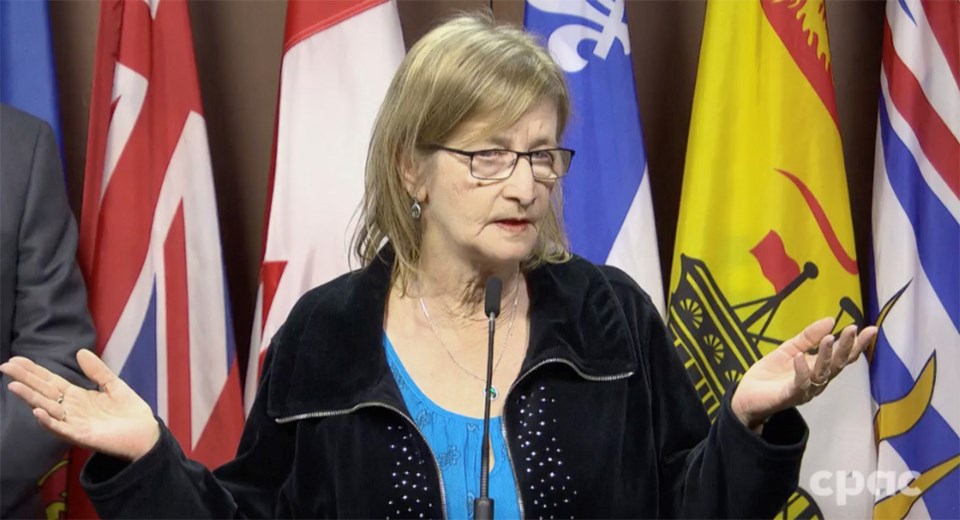
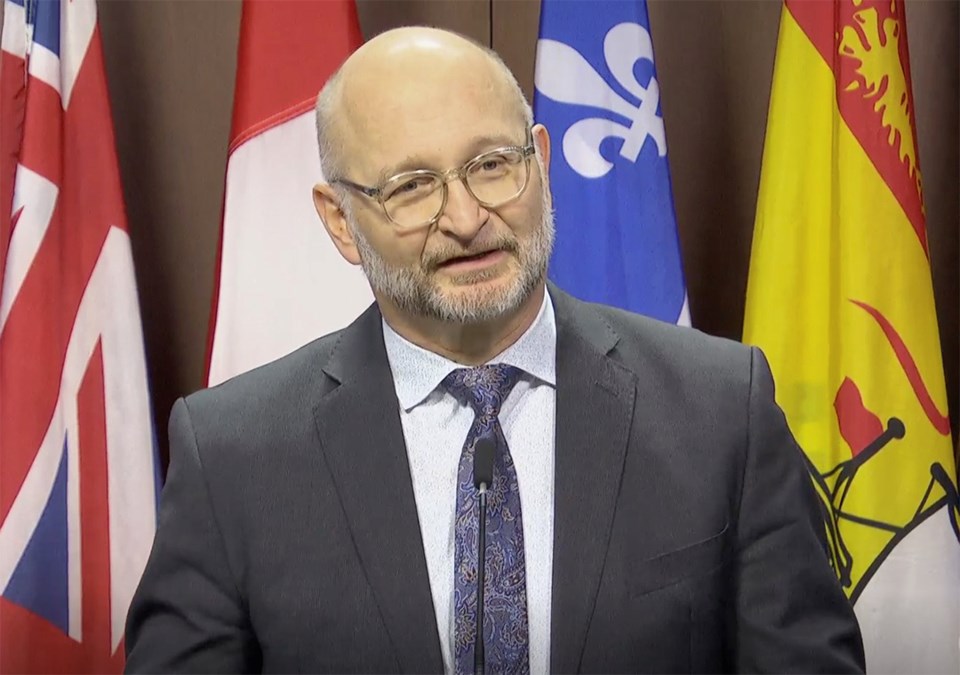
Choosing a name for Bill C-40
Naming the proposed legislation after David and Joyce Milgaard was James Lockyer’s idea, said Susan Milgaard.
She said in one of the earlier meetings that David Milgaard and James Lockyer had with Lametti about the creation of the commission, Lockyer said “wouldn’t it be nice if the law was named after David and Joyce Milgaard.”
“A few months ago, we were asked how we would feel about it as a family,” said Susan Milgaard. “We were like ‘yes, what a beautiful honour for both of them.' We are so very happy about it.”
Bill C-40 means David Milgaard not just another notorious error
David Asper and the late Hersh Wolch were the Winnipeg, Manitoba, lawyers behind the fight to free and exonerate David Milgaard.
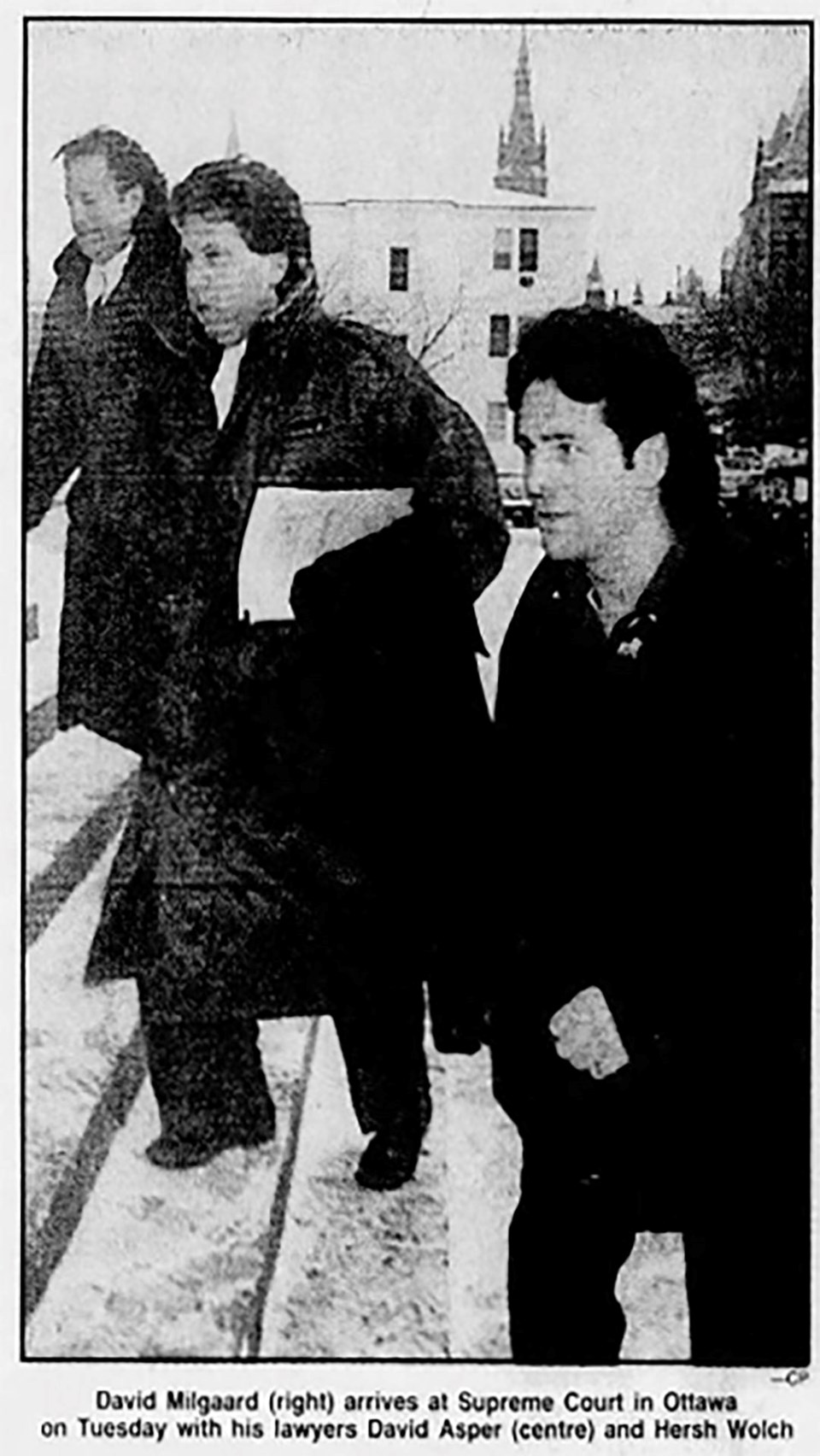
“I called, probably more like screamed, on Parliament to unanimously approve the proposed legislation and pass it expeditiously," Asper told SASKTODAY.ca on Saturday.
Asper commended Federal Justice Minister David Lametti for introducing the proposed legislation.
“I think I can speak for both of us and congratulate Mr. Lametti and the federal government for having the courage and the willpower to see this through,” said Asper.
“As lawyers we had a lived and immensely frustrating experience seeing systemic failures and the consequences. This is a huge change in criminal justice in Canada and full credit to the minister for actually getting it done.
“In addition to giving credit to the minister, I also reflect on David and all the other exonerees because it means that their horrible experience, and willingness to fight for change, has given deep meaning to this their lives,” said Asper.
“It means that David isn’t just another notorious error. It means that he and all the others mattered and their legacy will be a better criminal justice system.”
Current ministerial review process ineffectual: Milgaard
The new commission announced Thursday is expected to replace the current ministerial review process.
David Milgaard previously told SASKTODAY.ca that the ministerial review process was ineffective and “boiled down” to rules that only protected the people working within the justice system, keeping them from being embarrassed by their mistakes.
“They [rules] are protecting people who are responsible for all those injustices.”
David Milgaard said it’s important the new commission is up and running and people are freed from their cells, their cages.
“It doesn’t make sense to keep people for years and years and years inside prison when you know they are wrongfully convicted," Milgaard told SASKTODAY.ca. “It’s a sad reflection on our society in Canada that this kind of stuff goes on in the first place."
David Milgaard had told SASKTODAY.ca that he and his group met with federal Justice Minister David Lametti. He said his group consisted of himself, James Lockyer, Ron Dalton [who served eight-and-a-half years in prison after he was wrongfully convicted of murdering his wife], Lori Kuffner, and Ruth van Vierzen.
During the 2019 federal election campaign, the group obtained commitments from party leaders to create the commission if elected. After being re-elected in 2019, Prime Minister Justin Trudeau committed to the establishment of an independent Criminal Case Review Commission to make it easier and faster for potentially wrongfully convicted people to have their applications reviewed. In 2021, Lametti appointed retired Justice Harry LaForme and Justice Juanita Westmoreland-Traoré to start consultations on the creation of the independent Criminal Case Review Commission.
Former justice minister snubs Milgaards
David Milgaard and the Milgaard family endured decades of raised and crushed hopes after filing court appeals and parole applications that were denied. In 1971, both the Saskatchewan Court of Appeal and the Supreme Court of Canada dismissed David Milgaard's appeals. In 1990, then Justice Minister Kim Campbell refused to send his case to the SCC.
“I often tell the story about when Kim Campbell rejected our first application and I had to go to the prison and tell David what had happened,” Asper told SASKTODAY.ca.
“He was not in good shape mentally and had been misbehaving so they’d put him in an area known as administrative disassociation [sometimes called ‘the hole’]. I had to find a way through his mental fog and get him focused on what I had to say, and as the words came out of my mouth, he became progressively present in the moment. I was devastated and I guess it showed because it didn’t take long before he was giving me instructions that we needed to rally, keep going and take another run at it. Never quit. ‘Don’t let the bastards wear you down’ was his message. Hearing that, coming from his perspective was pretty remarkable.
“So, we rallied, and then we won,” said Asper.
Susan Milgaard said when she met with Lametti Feb. 16, they discussed the incident where then Justice Minister Kim Campbell publicly shunned Joyce Milgaard while television cameras rolled in May 1990. Joyce Milgaard had approached Campbell when she was in Winnipeg and humbly tried giving her proof of her son’s innocence.
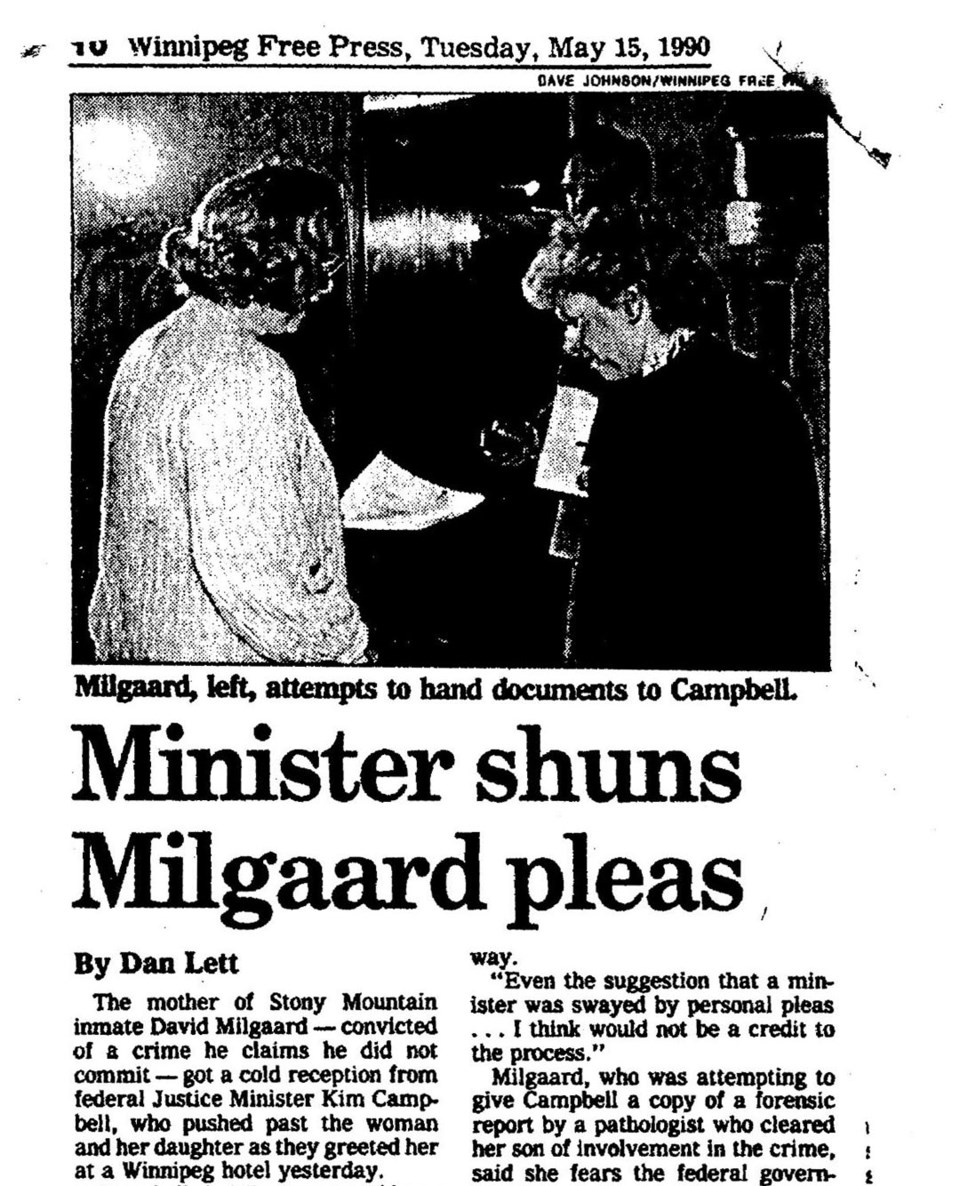
That pivotal moment captured a mother’s desperation and determination and ultimate humiliation. It was watched by millions and united the country in support of David Milgaard and the rallying cry to free him grew louder.
After that incident, the Milgaard family was able to get extensive media coverage in Eastern Canada, Susan Migaard told SASKTODAY.ca.
“That was the icing on the cake. She did that for us by treating my mom the way she did.”
It also caught the attention of Canada's then Prime Minister Brian Mulroney who stepped in and had Campbell review David Milgaard's case a second time. Campbell did and she sent it to the Supreme Court of Canada.

No one’s interested in something you didn’t do: Wheat Kings
Susan Milgaard told SASKTODAY.ca that when she met with Lametti in his office before the press conference Feb. 16, he showed her the Tragically Hip album that he had David Milgaard autograph. Lametti then played the Wheat Kings song in his office for her, she said.
“It was really wonderful, it was great.”
Legendary Canadian rock band Tragically Hip, in their October 1992 album Fully Completely, included the song, Wheat Kings, which they wrote about David Milgaard.

According to the book Top 100 Canadian Singles, Gord Downie from the Tragically Hip said Wheat Kings is “about David Milgaard and his faith in himself. And about his mother, Joyce, and her absolute faith in her son's innocence. And about our big country and its faith in man's fallibility. And about Gail Miller, all those mornings ago, just lying there, all her faith bleeding out into that Saskatoon snowbank."
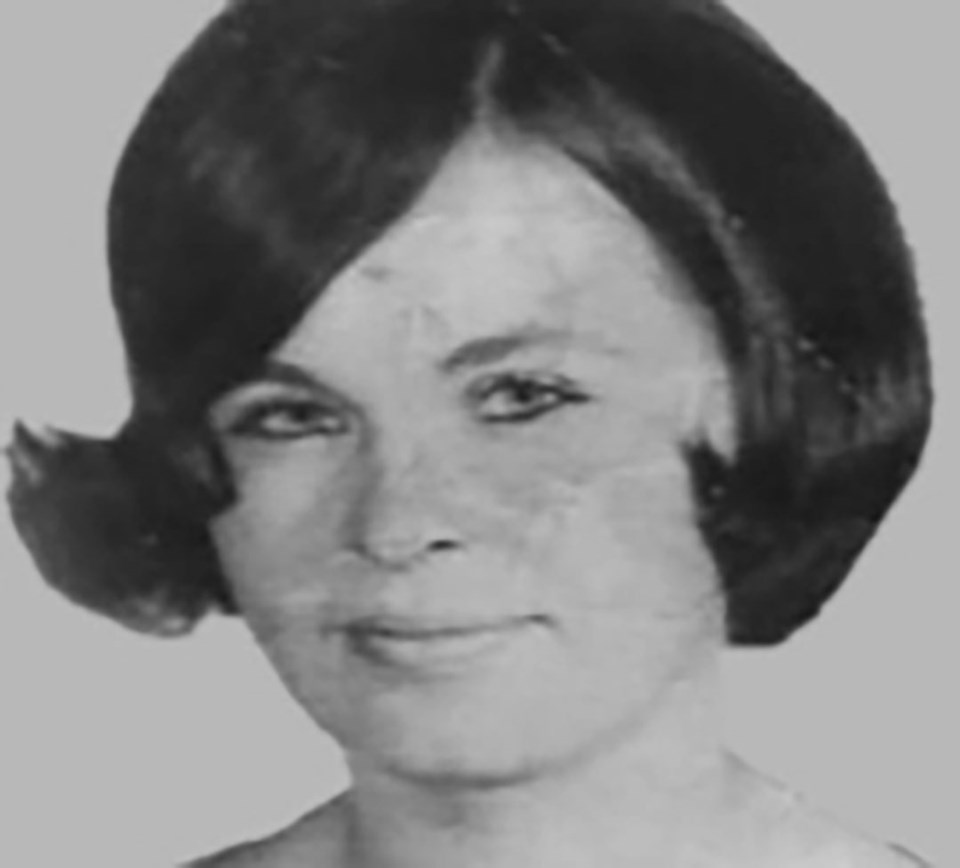
After David Milgaard was released from prison, he met the band and shook Downie’s hand and attended a concert where they dedicated Wheat Kings to him.
Asper also referred to the Wheat Kings song after Lametti's Feb. 16 announcement of David and Joyce Milgaard's Law.
“I wrote a chapter in a book on lawyers’ ethics, riffing off the line in Wheat Kings that ‘no one’s interested in something you didn’t do.’ What I basically said was that if this was the mindset of the system then we [lawyers, Joyce, David, media and the public] were going to grab the system and make it interested.
“At his news conference, Minister Lametti produced a copy of the Tragically Hip’s album that has the song Wheat Kings and which he had David autograph,” added Asper. “By proposing the new legislation, the minister has not only changed the criminal justice system but also neutered the bite of that lyric, and good on him for doing it!”
Helping others to help yourself
During David Milgaard's ordeal - from being arrested in 1969 at age 16, to being wrongfully convicted in January 1970, and finally freed from prison in April 1992 - he suffered unthinkable inhumanity and horror that no one should endure, let alone an innocent person. The hardships led him to three suicide attempts in prison.
He survived being shot in the back when fleeing from police after he had escaped in 1980 for 77 days as he grasped at the freedom he deserved.
Audio: Hear David Milgaard in his own words during a phone conversation with Lisa Joy/SASKTODAY.ca talk about when he was shot after he escaped.
To cope with prison life, the disappointment of losing appeals, and being turned down for parole because he wouldn’t admit to a crime he didn’t commit, David Milgaard told SASKTODAY.ca that he formed a justice group inside the prison. The group brought in various speakers to talk about social issues and he put out a newsletter.
“My mom always held me up to try to do good and believe in Jesus and keep moving in that direction," said David Milgaard.
"I decided to live my life as if I was Jesus myself. You would not believe the difference it made in my life in prison.”
Helping others, helped him.
“This gave me a real sense of morality and helped me inside prison. One thing you lose inside that place is your morality.”
Audio: Hear David Milgaard in his own words during a phone conversation with Lisa Joy/SASKTODAY.ca talk about helping others.
Starting advocacy work outside of prison
After David Milgaard got out of prison in 1992, he floundered and seemed lost with no purpose or direction in his life.
He did become involved with prison ministries through a British Columbia ministry and spoke to inmates at prisons and spoke to church groups. Then, in 2001, he gave his first known talk to university students at the Northern Alberta Institute of Technology in Edmonton where former CBC reporter Byron Christopher was teaching journalism students. Christopher was the first reporter to get an interview with Milgaard when he was released from prison in 1992 and became a close, lifelong friend of David and the Milgaard family.
“The students loved him,” Christopher told SASKTODAY.ca on Friday. “He spoke from the heart and he was honest. He was comfortable with the students.
“I suggested he do more of that,” added Christopher.
One of the students who heard David Milgaard speak that day decades ago remembers the talk well.
“He was very honest and said in prison being honest is very important and that how you behave in prison will affect your experience there,” Ian Afflect told SASKTODAY.ca on Friday.
“When I asked him how he managed his anger towards the people who put him there, he said the biggest lesson he learned in life was to forgive. He met better people in prison than the majority of people on the outside.”
Before Milgaard’s talk to students, Christopher tipped off Tom Barrett at the Edmonton Journal who showed up to do a story and capture the moment.
“Next morning the Journal arrived at my door and David, over coffee in the kitchen, read it and was excited that we were together in the same story,” said Christopher. “He wanted a copy of the paper for himself and another for his mother, Joyce. So, we walked over to 7-Eleven and bought two copies. I remember how pumped he was walking back, holding the papers."
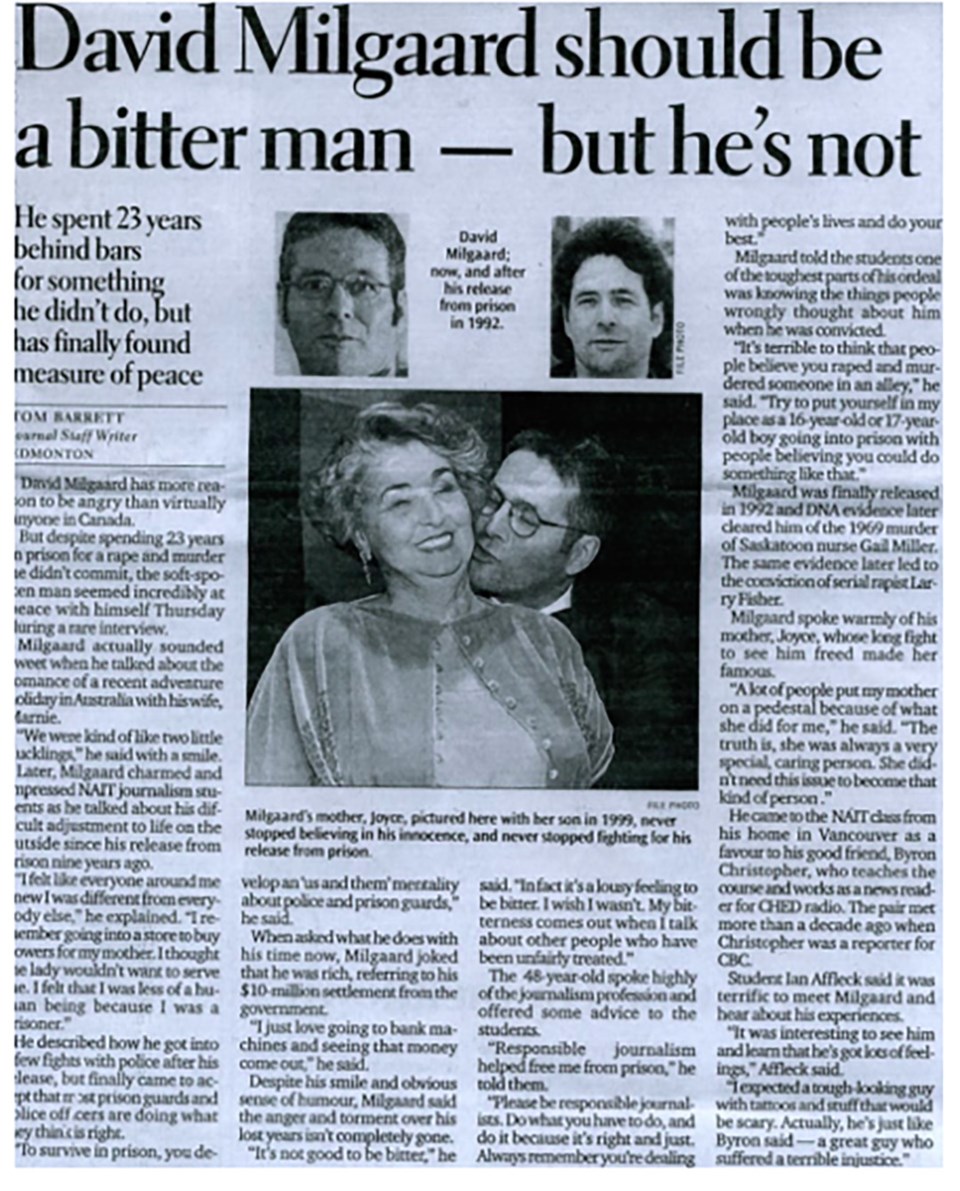
“After that, David always phoned to let me know who he was helping and where he was talking. David seemed to find himself when he found others.
“I'm glad he reached out to help others,” added Christopher. “The world can be a cruel place but David made it a better place. David punched up, not down. He took on the big guys, never bashed anyone when they were down. I was proud of him for that."
For the next two decades, David Milgaard lectured law students at universities across the country. He advocated for the independent Criminal Case Review Commission. He spoke against Canada’s punitive justice system and advocated for a restorative justice system.
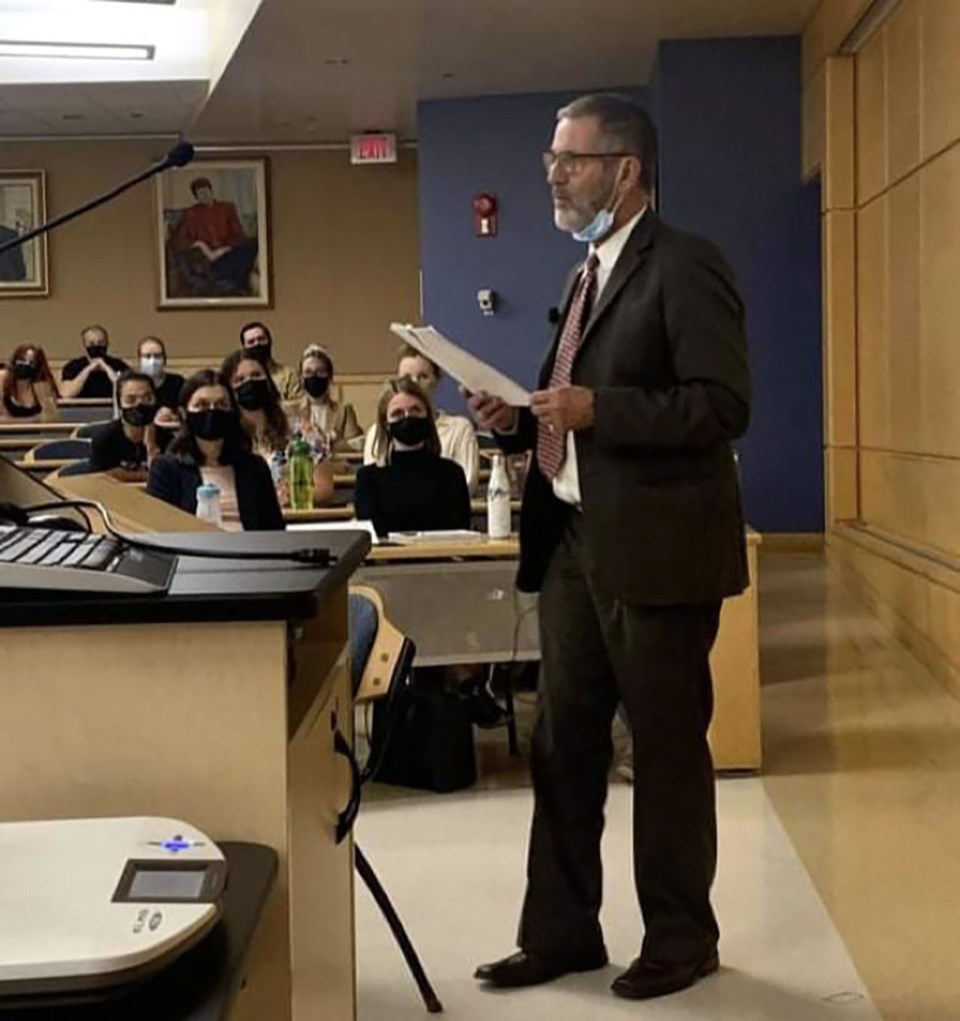
Honorary Doctor of Law degree
In 2020 — 50 years after Milgaard’s wrongful conviction – the University of Manitoba announced they were presenting him with an Honorary Doctor of Law degree.
Milgaard died May 15, 2022, three weeks before he was to receive his honorary degree on June 6, 2022. Winnipeg lawyer David Asper – who led the fight for Milgaard’s freedom – also received an honorary doctorate that day and accepted Milgaard’s degree.
Going to war to prove David Milgaard’s innocence
The CTV television movie, Hard Time, about David Milgaard came out in 1999 and won six Gemini Awards including Best TV Movie or Dramatic Mini-Series. In the movie, David Asper, a young, green defence lawyer, was portrayed as the one who first picked up the torch to free David Milgaard. Joyce Milgaard had persistently gone to their law firm, trying to get Asper and Wolch to look at her son’s case.
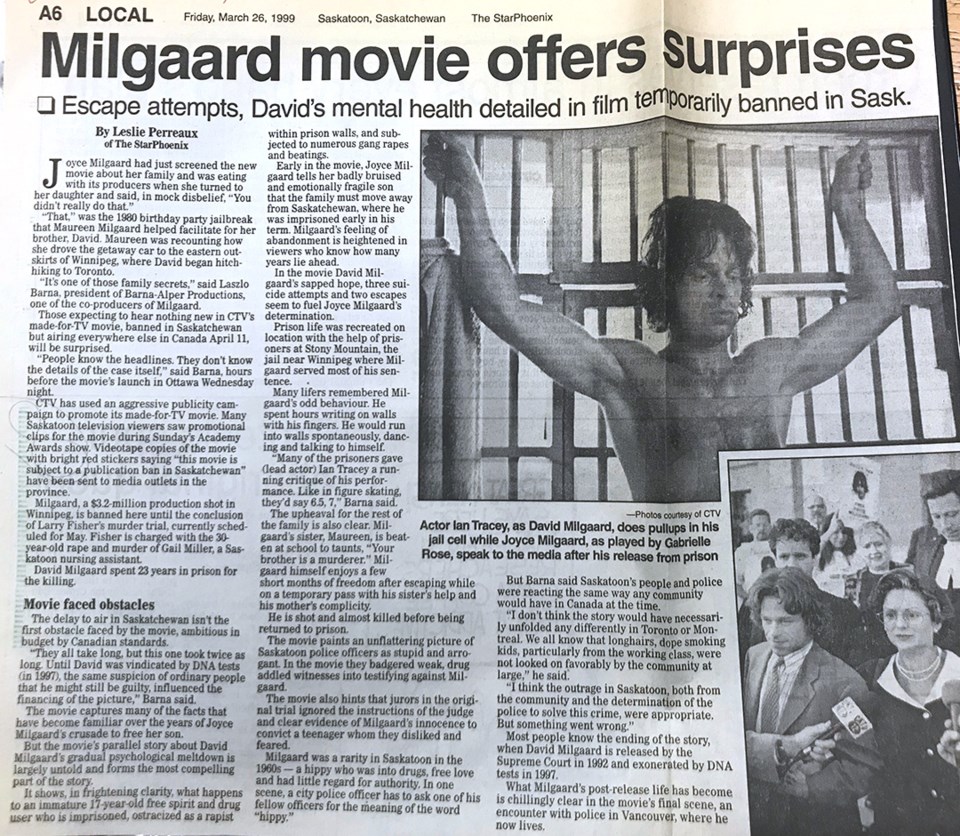
“Early on in our representation of David, I went to Saskatoon in late January and re-enacted the Crown’s theory of the case putting David at or near the scene of the crime, based on the evidence at trial,” Asper told SASKTODAY.ca.
“I could immediately see, plain as day, that it made no sense and this is how I was able to show Mr. Wolch and the other partners at the law firm that we needed to dive into the case.
“I couldn’t absolutely say that David was innocent, but I could see that some of the key incriminating facts at the trial couldn’t possibly be true when taken in context of all the facts.”
“We spent six years after that trying to unravel more facts and pound on doors to be heard,” added Asper. “Even after we identified a more likely perpetrator, who was later proved to be the perpetrator, we were still turned down by the justice minister.
“We ultimately had to think about our professionalism and ethics, which are pretty core to who and what a lawyer has to be. I certainly chose to cast niceties aside and go to war for David on the basis that if our tactics to free an innocent man were somehow unethical, then I wanted nothing to do with being a lawyer. That’s a pretty big choice.
“I did come to visualize a day when we walked David out of Stony Mountain Prison, and it eventually happened," said Asper. "It was a great day that I’ll never forget, not because of what I felt but because of what David, Joyce and the Milgaard family felt.”

Then the outrage at the injustice set in.
Rage against the system
“It didn’t take long for me to be angry, and as I went back into my regular world of being a defence lawyer, I didn’t want any part of it and decided to stop doing it," David Asper told SASKTODAY.ca. "So, happy for sure, but also disillusioned and angry.”
Asper and Wolch got David Milgaard freed from prison but he was still perceived by many as guilty of Gail Miller’s rape and murder.
“It all came back about five years later when the DNA results fully exonerated him and then eventually convicted Fisher,” said Asper.
Audio: Hear David Milgaard in his own words during a phone conversation with Lisa Joy/SASKTODAY.ca talk about getting the DNA results that exonerated him.
“I still speak periodically to groups about the case and every time I open my box of materials, I get lit up about what happened and how it was so unnecessary," said Asper. "How it destroyed a young man, David, his family, and how it allowed a very dangerous person to keep hurting people.”
It was decades ago that Asper and Wolch got David Milgaard freed from prison and eventually exonerated. The difficult, painful journey for justice, however, has resulted in remarkable changes to Canada’s legal system today.
“It’s hard to separate the positive systemic changes from the vicarious experience of living with David and his family while he was still in prison and running into the brick systemic walls all around him and us,” Asper told SASKTODAY.ca.
“During the period when I represented him, I built my practice as a lawyer, got married, had kids, volunteered in the community and had a life. He didn’t.
“So, there were and are some happy endings, but the beginning and middle of the story still hurt,” said Asper.
David Milgaard’s legacy
David Milgaard came out of a more than two-decades long nightmare with the ability to forgive and see the good in people. He turned a horrible situation into a force for good and he wasn't afraid to hold power to account.
"He took on the establishment, and that takes guts," said Christopher. "David punched up, not down. He took on the big guys, never bashed anyone when they were down. I was proud of him for that."
Milgaard was the subject of three books [When Justice Fails: The David Milgaard Story; Real Justice: Sentenced to Life at Seventeen; and A Mother’s Story: The Fight to Free My Son David Milgaard] as well as three movies [The David Milgaard Story; the docudrama Milgaard; and Crime Stories]. He was the subject of the song Wheat Kings by the Tragically Hip in their 1992 album. Also, Canadian artist David Collier depicted Milgaard’s story in his 2000 comic book Surviving Saskatoon.
In June 2021, David Milgaard told SASKTODAY.ca that he planned to retire in a year. This is something he also often told his family.
“That’s the sad thing," said Susan Milgaard. "He really wanted desperately to spend time with his kids."
David Milgaard died May 15, 2022, but his work to change Canada’s justice system lives on.
“I know exactly what David’s legacy is,” said Susan Milgaard.
“He has two beautiful children that’s David’s first and foremost legacy, his children. They meant more than anything to him.”
David Milgaard instilled his sense of social justice in his children Robert and Julia Milgaard. He told SASKTODAY.ca that he was proud of his daughter Julia’s high marks in school and his son Robert’s sense of social justice.
He said he had "kids with really good hearts."
Audio: Hear David Milgaard in his own words during a phone conversation with Lisa Joy/SASKTODAY.ca talk about his children.
Robert Milgaard told SASKTODAY.ca that fighting for social justice like his dad is something he would do, adding, however, “I don’t know if I would make it my lifetime thing to do. It’s definitely something I would fight for.”
Mrs. Milgaard told SASKTODAY.ca that David spent a lot of time with their children.
“He hung out with them all the time and had fun. He knew how to have fun with them.”
Robert Milgaard said he misses everything about his dad.
“His laugh, fishing, camping, the truck, everything we did together,” said Robert Milgaard.
After his legacy of his two children, Susan Milgaard said it’s the work he did and how it has finally come to fruition. She said their late father, Lorne Milgaard, would be happy it got to this point.
She didn’t hesitate to say what her mother’s reaction to the announcement of David and Joyce Milgaard’s Law would have been.
“I know exactly what my mother would say. She would say ‘hallelujah it’s a glorious day today.’
“And for David, I’m sure David would say, ‘Finally. Now we can go fishing.’”

— Click for more from Crime, Cops and Court.



